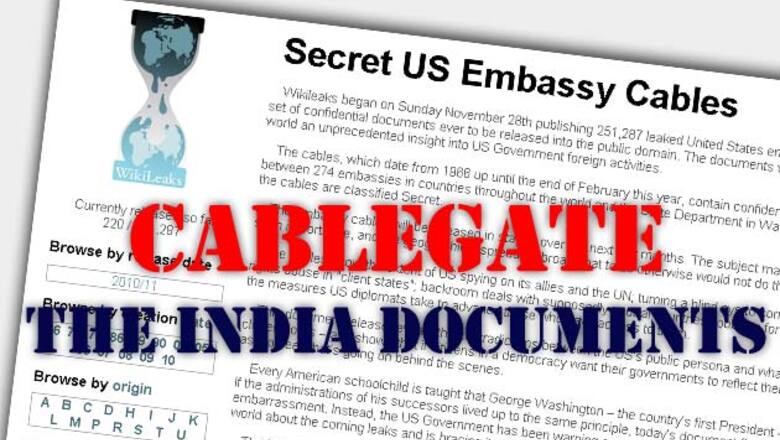
views
Cable 10ROME87, STAFFDEL KESSLER DISCUSSES IRAN WITH MFA, ENI, PD
Reference ID: 10ROME87
Date: 2010-01-22 15:03
Classification: CONFIDENTIAL
Origin: Embassy Rome
VZCZCXRO5383
OO RUEHAG RUEHROV RUEHSL RUEHSR
DE RUEHRO #0087/01 0221531
ZNY CCCCC ZZH
O 221531Z JAN 10
FM AMEMBASSY ROME
TO RUEHC/SECSTATE WASHDC IMMEDIATE 3170
INFO RUCNMEM/EU MEMBER STATES COLLECTIVE PRIORITY
RUEHBUL/AMEMBASSY KABUL PRIORITY 0574
RUEHFL/AMCONSUL FLORENCE PRIORITY 3989
RUEHMIL/AMCONSUL MILAN PRIORITY 0433
RUEHNP/AMCONSUL NAPLES PRIORITY 4216
RUEHUNV/USMISSION UNVIE VIENNA PRIORITY 0176
C O N F I D E N T I A L SECTION 01 OF 03 ROME 000087
SIPDIS
E.O. 12958: DECL: 01/12/2020
TAGS: PREL ENRG KNNP PARM IR PGOV
SUBJECT: STAFFDEL KESSLER DISCUSSES IRAN WITH MFA, ENI, PD
REF: ROME 00035
ROME 00000087 001.2 OF 003
Classified By: DCM Elizabeth Dibble for reasons 1.4 (b) and (d)
SUMMARY
-------
¶1. (C) Staff Director of the House Foreign Affairs
Committee (HCFA) Dr. Richard Kessler and HCFA staff members
probed senior MFA and energy and gas parastatal Eni officials
on Italy's intentions concerning Iran sanctions and prospects
for effective multilateral action to curb Iran's nuclear
program. Opposition Democratic Party (PD) officials
discussed Iran, Italy's role in Afghanistan, the MEPP, Iraq,
and nonproliferation with the Staffdel. End Summary.
IRAN DOMINATES MFA TALKS
------------------------
¶2. (C) A January 8 roundtable discussion with Dr. Kessler
and three HCFA staff members at the Ministry of Foreign
Affairs (MFA) included MFA Director General for Multilateral
Political Cooperation Stefano Ronca, Ronca's Deputy Filippo
Formica, and Deputy DG for Economic Cooperation Claudio
Spinedi. Office Directors Massimo Marotti
(Political-Military Security and NATO Affairs); Diego
Brasioli (G8 Issues and Global Challenges); and Giovanni
Pugliese (Arms Control and Nonproliferation) also
participated. After the roundtable the Staffdel had a meeting
with MFA Deputy SecGen and Political Director Sandro De
Bernardin. Post was represented by the Charge, Pol-Mil
Counselor and Poloff (notetaker).
¶3. (C) Ronca believes the deteriorating situation in Iran
will soon come to a head and that the UNSC should convey to
Iran that delay tactics will not work and support this
position by readiness to adopt further pressure. Ronca and
Spinedi told the Staffdel Italy is ready to explore, with its
EU colleagues, the possibility of further sanctions, which,
however, must conform to EU regulations, and not affect the
legal rights of European companies. Ronca suggested that the
Iranian financial, oil and gas, and insurance sectors (but
not the Central Bank) could be targeted and that the list
sensitive products on the export ban list could be expanded.
¶4. (C) Spinedi, who (with Formica) attended the October 7
Washington meeting of "Likeminded States on Iran," started by
briefly alluding to Italy's longstanding complaint of
exclusion from P5 1. Spinedi pointed out we needed to
determine what kind of sanctions would be acceptable to China
and Russia, adding that even at the beginning of January,
China's UN ambassador said that China "needed more time,"
which, Spinedi noted, was not a total rejection of tougher
sanctions. Spinedi advocated strengthening what already
exists and deciding where we are willing to exert additional
pressure (especially in the oil and gas sector). It would be
important to determine which technologies others (e.g., China
and India) are willing to provide and embargo those which
they cannot. Spinedi acknowledged that Italy had not yet
imposed legally binding sanctions, but that the GOI had
successfully used "moral suasion."
¶5. (C) Spinedi noted that sanctions proposed by the U.S. at
the October 7 Likeminded meeting included targeting the
Iranian Revolutionary Guard Command (IRGC), but did not
include an embargo of refined oil and gas products. Spinedi
echoed Ronca in saying that in the coming months Italy will
need to see how the rest of the Europe will approach new
sanctions.
¶6. (C) MFA Deputy SecGen Sandro De Bernardin told the
Staffdel that Italy was well aware of the danger posed by
Iran and supported a "firm line." De Bernardin noted Eni's
considerable investments in Iran and characterized Italy's
"moral suasion" efforts to wean Iran away from its nuclear
ambitions as a "significant success." On sanctions, De
Bernardin stated that Italy was prepared to assume its "share
of responsibility," but that sanctions are a means of
pressure, not a goal; effective ones must be found. In De
Bernardin's view, U.S.domestic legislation should not
negatively affect other countries and the presidential waiver
has been useful in the past; he hoped it will still figure in
the future.
¶7. (C) Kessler encouraged Italy to continue and reinforce
ROME 00000087 002.2 OF 003
their past efforts. De Bernardin agreed that if Iran gets
the bomb, then others will seek to acquire nuclear weapons
too and that the Iranian regime must realize there is a heavy
price to be paid for persisting in non-compliance. " De
Bernardin reiterated Italy's support for openess to dialogue
in addition to pressure, or the dual-track approach, and that
"putting Iran in a corner" is not the same as "cutting it
off" and characterized Italy as a "crucial player," essential
to catalyzing consensus in Europe. He added that, given
Iran's critical domestic situation, the regime was not in a
position to decide anything.
KEY TO SUCCESS IN AFGHANISTAN
-----------------------------
¶8. (C) With regard to the critical situation in
Afghanistan, Ronca acknowledged that we must strengthen the
military aspect of the campaign, but that institution
building and engaging President Karzai on fighting corruption
must not be neglected. On the security side, Ronca said that
Italy will increase its force by 1000 men during the first
half of 2010 and that its Afghan National Police (ANP)
training program is a first priority. As for civilian
engagement, Italy has committed 465 million euros in various
civilian sectors, including health, education, and justice.
Ronca and Marotti stressed the need for better coordination
of civilian and military activities as an issue that should
be on the agenda of the January 28 London NATO conference.
Ronca noted that reaching out to insurgents was a task that
should also be pursued. The Italians stressed the need for a
long-term development strategy based on Afghan priorities,
but which would also include private sector involvement and
the development of good governance.
CENTER LEFT PD AIRS FOREIGN POLICY POSITIONS
--------------------------------------------
¶9. (C) Head of the opposition Partito Democratico's (PD)
Foreign Policy Department Piero Fassino told the Staffdel the
PD supports President Obama's initiative to dialogue and
build bridges with the Islamic world, but is very concerned
about the blocked MEPP and the "new wave of terror" in
Afghanistan. As for Iran, the PD supports pursuing a
negotiated solution, but Fassino questioned whether the
current leadership is in a position to negotiate credibly.
He suggested it could be useful to change the order of
priorities in Iran; that is, be more flexible on the nuclear
issue, but harder on human rights. According to Fassino, the
greatest risk with nuclear proliferation is that
irresponsible governments like the one in Iran could gain
access to nuclear arms, adding that the PD assessed that
there was little to fear with nations such as India, Britain,
and France having nuclear weapons. He asked whether a
democratic government in Iran might not have a different
position on the nuclear program.
¶10. (C) Fassino said the PD supports the GOI's increased
(military) support for Afghanistan, but stressed that
strengthening civil and governmental institutions and
economic development are equally important. On the MEPP,
Fassino characterized Netanyahu's proposed 10-month
settlement freeze "a little window of opportunity," but
questioned whether it was enough, given the Israelis' refusal
to discuss (the status of) Jerusalem. As for Iraq, Fassino
said the stabilization process must be supported; there was
no alternative.
ENI JUSTIFIES IRAN ACTIVITIES
-----------------------------
¶11. ( C ) Energy and gas parastatal Eni (Ente Nazionale
Idrocarburi) officials told the Congressional delegation that
it is cooperating to address USG concerns over the company,s
Iran activities, but insisted that it will continue to
fulfill its contractual obligations there. The company
officials said that Eni has understood the USG message to
reduce its presence in Iran, and as a result it has already
decreased its Iran activities to a minimum level. The Eni
officials provided the Staffdel with a copy of the November
16, 2009 CEO Scaroni letter to Ambassador Thorne that states
the company,s position (A copy of Eni's letter was provided
to EEB in November). Referencing this letter, the officials
pointed out that Eni will not undertake new activities in
Iran, including no new activities by its subsidiaries, Saipem
ROME 00000087 003.2 OF 003
and Polimeri Europa. They added that following Scaroni,s
September 16 meetings in Washington the company also gave up
plans for an MOU with Iran for development of the phase III
of the Darquain oil field. The officials stated that while EU
law prevents the Eni from responding to official requests for
information on its Iran operations, it has been transparent
in informing the USG on a voluntary basis.
¶12. ( C ) The Eni officials stated, however, that Eni
intends to carry out exploration and development activities
in Iran that fall under its contractual obligations there.
The officials acknowledged that this is a &gray area8 due
to the differences of opinion between the company and the USG
over what is &new8 activity and what is &old.8 The
company officials said that they hope to clarify this issue
with Washington during separate meetings in January with
senior officials from the State Department and Department of
Treasury. Pressed for details over the company,s existing
obligations, the officials said that it is under contract to
meet certain targets of (oil) production in order to
guarantee defined levels of production within a given time
frame. They added that Eni must keep a certain threshold of
production in order to recover its investments in Iran. They
also explained that Eni receives periodic (possibly
scheduled) payments by Iran in oil equivalent amounts that
correspond to the attained target levels of production.
¶13. ( C ) The Eni officials admitted the frustrating
difficulties of operating in Iran, but stated that Eni's
priority is to recover its investments there while meeting EU
laws. The officials estimated Eni's total Iran investments at
around $3 billion dollars, of which they said Eni has already
recovered already about 60 percent (or about $1.7 billion
according to one Eni representative). The company officials
said Eni still needs to recover about $1.4 billion from its
Iran operations. They added that &if all goes as planned8
Eni will recover this remainder of its investments by the end
of 2013 or early in 2014. They further explained that Eni's
Iran contracts provide the possibility of extensions if the
company is not able to recover its investments within the
stipulated time frame. The Eni officials cautioned that the
company may face EU sanctions if it withdraws from Iran due
to pressure from USG unilateral sanctions.
¶14. (U) Staffdel Kessler has not cleared this cable.
THORNE
Reproduced from cablegate.wikileaks.org
List of India-related documents from the first batch of 226 documents released by WikiLeaks
(India-specific portions highlighted in bold)
- To avoid hurting Pakistan, Turkey didn't invite India
- Bahrain's King Hamad on India's role in Afghanistan
- UN Security Council expansion and India
- Indo-Pak relations and Musharraf
- Pakistan's obsession with India
- India critical of sanctions on Iran
- Saudi Arabia expanding relations with India
- 'Little to fear about India having nuclear weapons'
- Iran could follow India's path in going nuclear
- Differing opinions of US and India
- India benefitting from international security
- Fissile Material Cutoff Treaty and India
- Nuclear facility safeguards in India
- Israel-India strategic partnership
- Non-proliferation and India
- Indo-US trade relations and foreign aid
- Sanctions and German business interests in India
- Some Indian-origin people supplying equipment to Iran
- Germany on US-EU position towards India
- Israeli relations with India
- Reliance Industries oil and gas exploration
- US-Indian economic cooperation and Indo-Pak relations



















Comments
0 comment